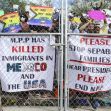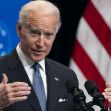Is it a travel ban? Is it a Muslim ban? Is it a valid exercise of presidential authority? The Supreme Court has heard oral arguments in Trump v. Hawaii, the case challenging the constitutionality of President Trump’s Executive Order halting immigration from six predominately Muslim countries. The order is in effect while the court deliberates, and while the court deliberates, the rest of the country argues over whether the order is anti-Muslim or anti-terrorism, and people seeking to immigrate or already temporarily in the U.S. remain uncertain about their prospects for the future.
President Trump signed Executive Order 13769, titled Protecting the Nation from Foreign Terrorist Entry into the United States, on January 27, 2017. Within two days, the American Civil Liberties Union (ACLU) had obtained a temporary injunction from a federal court blocking certain consequences of the order. A federal court in Washington halted the order nationwide on March 3rd, and the President signed a modified version on March 6th. This order was blocked by a federal judge in Hawaii nine days later. The United States Supreme Court agreed to take up the case in June and allowed a portion of the order to go into effect while the case was pending.
On September 24th, President Trump signed a third version of the travel ban. This latest version limits immigration from six predominately Muslim countries in the middle east: Iran, Libya, Somalia, Syria, Sudan and Yemen. Also restricted are immigrants from North Korea (who weren’t exactly flooding our borders anyway) as well as certain groups of people from Venezuela. The ban prevents people from the listed countries from emigrating permanently to the US and also halts temporary stays for tourism, work or study, depending on the country.
This latest version of the travel ban became the subject of the Supreme Court’s April 25th oral argument hearing in the case of Trump v. Hawaii. Lower courts had determined that the various versions of the ban were unlawful nationality-based discrimination. It remains to be seen how the high court will rule, but based on the tone of questioning from the bench, it seems that the justices may be willing to give the president the benefit of the doubt that this is not a Muslim ban, despite his campaign rhetoric and Tweets to the contrary.






